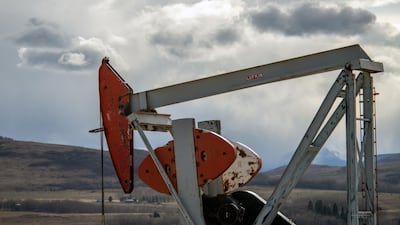Oil continued to trade higher and posted a second straight weekly gain on supply concerns as the EU moved towards phasing out Russian oil imports gradually by the end of this year amid Moscow's continuing conflict with Ukraine.
Brent, the global benchmark for two thirds of the world's oil, settled 1.34 per cent higher at $112.40 a barrel at the close of trading on Friday. West Texas Intermediate, the gauge that tracks US crude, was up 1.39 per cent at $109.80 a barrel.
For the week, WTI gained about 5 per cent, while Brent rose nearly 4 per cent as the EU, the world’s largest trading bloc, announced plans to ban Russian oil over the next six months and refined fuels by the end of the year. The proposal, however, is yet to be officially approved by the EU Parliament.
The EU is heavily dependent on Russian imports. In 2021, the bloc imported 155 billion cubic metres of natural gas from Russia, which accounted for about 45 per cent of EU gas imports and close to 40 per cent of its total gas consumption, International Energy Agency figures indicate.
Crude prices “head higher as energy traders completely fixate over the looming European sanctions on Russian oil”, said Edward Moya, senior market analyst at Oanda.
“No one wants to be on the wrong side of a major crude supply disruption headline, so whatever oil price dips that happen will be short-lived.”
The US oil rig count continues to rise, but that has not led to increased production. Oil rigs rose by five to 557, the weekly Baker Hughes report showed.
Opec+ also agreed on Thursday to stick to its plan to increase production gradually, which is supporting oil prices. The group, comprising the world’s top oil producers including Saudi Arabia and Russia, will add 432,000 barrels per day of crude to the market in June as it unwinds a record production cut of 9.7 million bpd to boost supply in the market.
The imposition of Covid-19 curbs in parts of China, the world’s second largest economy and the top importer of oil, is weighing on crude prices, limiting further gains.
China has introduced strict movement curbs in Shanghai, its largest city, to control the spread of the pandemic. New cases have also been detected in the capital Beijing as the government continues to carry out mass testing to isolate every infected person as part of its “zero-Covid” strategy.
Last month, the International Monetary Fund also lowered its 2022 growth forecast to 3.6 per cent from its previous estimate of 4.4 per cent in January.
"Along with the EU’s planned ban on Russia, the 10 per cent gain in oil prices over the last two weeks was also due to the minimal increase in oil output from the Opec during April 2022," said Junaid Ansari, head of investment strategy and research at Kamco Invest.
"Bloomberg data showed flattish production at 28.7 million bpd during the month, mainly led by a decline in production in Libya and Nigeria that fully offset higher production coming from Iraq and Saudi Arabia."
The US government's plan to buy back oil to replenish oil inventory is also supporting prices, he added.
Last month, Libya declared force majeure at Zueitina oil terminal, Brega oil port as well as Al Sharara oilfield and El Feel oilfield, also known as the Elephant field, because of the ongoing political turmoil in the country. It, however, resumed operations at Zueitina oil terminal earlier this month to boost exports.
Force majeure refers to an unforeseen set of circumstances preventing a party from fulfilling a contract.


